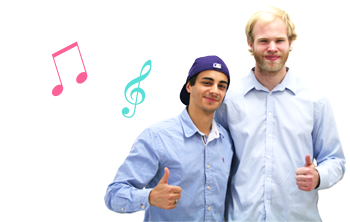Q&A
How to apply
- If I have already obtained the certificate for students who reach the high school diploma level, can I apply?
- If I can’t speak Japanese well, can I apply by myself?
- What are the financial supporter qualifications and required documents?
- I have entered Japan several times in a short period of time in the past, can I still apply?
- If I am a short-term student and I want to become a full-time student, can I change my visa in Japan?
How to enter university
- Please tell me about the schedule for going to a university in Japan.
- What is the difference between Examination for Japanese University (EJU) and Japanese-Language Proficiency Test (JLPT)?
- What are the requirements of applying for university in Japan?
About life in Japan
Q:If I have already obtained the certificate for students who reach the high school diploma level, can I apply?
A:Yes. Those who successfully complete the high school diploma level test are considered to have the same level of education as high school graduates.
Q: If I can’t speak Japanese well, can I apply by myself?
A:We have Korean, Chinese, English and Vietnamese speaking staff. You can consult us in your first language and we will support you throughout the process.
Q:What are the financial supporter qualifications and required documents?
A:A financial supporter is a person who pays for all expenses such as tuition and living expenses while the student is in Japan. In most cases, the parents of the student will be the financial supporter. The qualification is to have the ability to pay various expenses, but as proof of these, the certificate of employment (for company owner, a copy of the business certificate), the bank balance certificate (3 million yen or more or equivalent to 3 million yen) You will need to submit your home currency and income certificate. Furthermore, you may be asked to submit a tax payment certificate, a process for creating funds.
Q:I have entered Japan several times in a short period of time in the past, can I still apply?
A:It depends on the number of arrivals in Japan in a short period of time, the purpose of entry, the length of stay, etc.
Q:If I am a short-term student and I want to become a full-time student, can I change my visa in Japan?
A:Even if the application result is announced during your stay in Japan, you cannot change your status of residence in Japan. It is required for you to return to your country once and follow the designated procedures. The same rule applies when you change the application from The Working Holiday Visa to Student Visa (excluding some nationalities).
How to enter university
Q:Please tell me about the schedule for going to a university in Japan.
A:It depends on the university, but please see here for the rough schedule.
Q: What is the difference between Examination for Japanese University (EJU) and Japanese-Language Proficiency Test (JLPT)?
A:EJU is to evaluate the proficiency of Japanese language and basic academic abilities of international students who wish to study at undergraduate level in universities or other higher educational institutions in Japan. The examination is held 2 times a year in June and November.
JLPT is to evaluate Japanese level for foreigners and there are 5 levels from N5 to N1. The examination is held 2 times a year on the first Sunday of July and December. Students who passed N1 or N2 might be able to enter university or vocational school without taking any Japanese Test during enrollment.
Q: What are the requirements of applying for university in Japan?
A:Students have to complete 12 years of education in their home country or any qualifications on same level. Also, students have to pass or will pass JLPT at least level N2.(Beginners can reach N2 level after 1 year studying.)or score at least 200 points at Japanese test of EJU. If students have one of above qualifications, they are recognized to apply the universities in Japan.
Unfortunately, application requirements are different from each university so please ask the person in charge of entering to higher education.
About life in Japan
Q: Can I do part-time jobs in Japan? And what kind of jobs I can do?
A:'Yes, you can. International students are allowed to work with "work permission" (Permission to engage in activity other that that permitted under the status of residence previously granted) from the Ministry of Justice. With this work permission, the students can work 28 hours in 7days. In general, many students work part-time at supermarkets, convenience stores, restaurants, etc. In addition, part-time work is prohibited in places in the adult entertainment business and gambling facilities.
Q: Is Wi-Fi available at school?
A:You can use Wi-Fi in the 1st floor lobby, as well as on the 2nd and 7th floors.
Q: Does school provide scholarship?
A: Yes. Please click here for more information.
Q: Besides Japanese Language, can I learn any other subjects?
A:At our school, we offer various opportunities to experience and learn about Japanese culture, such as the Caregiver Practice, Practical Japanese Course, Field Trip, and First Aid Training. (For the schedule of each event, please refer to this page.) We also offer a preparatory course for the Examination for Japanese University Admission for International Students (EJU) called "J Mugen Juku," where students can take classes necessary for university admission. (Additional fees apply.)





